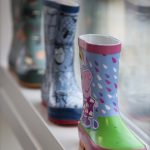
Some great ideas to help them (and you) prepare over the Summer on BBC bitesize https://www.bbc.co.uk/bitesize/articles/znc9vk7
1. Help them take responsibility (encourage them to help tidy up, clear their own plate, find their shoes etc.)
2. Encourage them to problem solve (you want to reach your toys, how can I help you?)
3. Help them get dressed (and undressed)
Help them be confident changing shoes, dressing and undressing; All will help independence when doing P.E
Make a game out of putting on their school uniform and changing into their PE kit, hen changing back again. You’ll soon find out which bits they need to practice.
If your child goes to nursery or pre-school, they’ve probably already mastered putting on their coat. There are some interesting techniques including laying the coat on the floor, putting arms in and flipping it over the head – whatever works for your child. And when it comes to shoes, velcro or slip on’s are easiest
4. Support them at lunch time
Help them to get used to sitting at the table to eat, use a knife and fork. This will help them at lunch time. Lunchtime usually lasts around half an hour, so slowly get them used to sitting at the table without getting up and down and using cutlery to eat their food; it will be expected of them at school.
5. Help them go to the toilet, wash and dry their hands
Help them be independent toileting, wear loose clothing with easy fastenings or just elastic waist, will help, wiping themselves properly and washing hands after.
Make sure your child is happy going to the toilet on their own, their uniform is easy to pull down and up (or up and down, elastic waits without belts are best for little ones), and they feel confident enough to put their hand up and ask to go.
Don’t worry if they have the odd accident as they’re settling in – it’s ok, nobody will be cross with them. It’s something teachers and teaching assistants are used to; and help is at hand when it’s needed.
Talk about how important it is to wash their hands really well after going to the toilet. Try covering their hands with paint (the germs) and getting them to practice washing it all off.
6. Help them recognise their name
It’s helpful if your child can recognise their name written down (you can practice this when you’re labelling all their stuff!) but really don’t worry if they can’t, teachers often put a picture or photo by each child’s name on their pegs and trays to make it easier for them.
Problem solving and taking responsibility are all familiar on our programmes